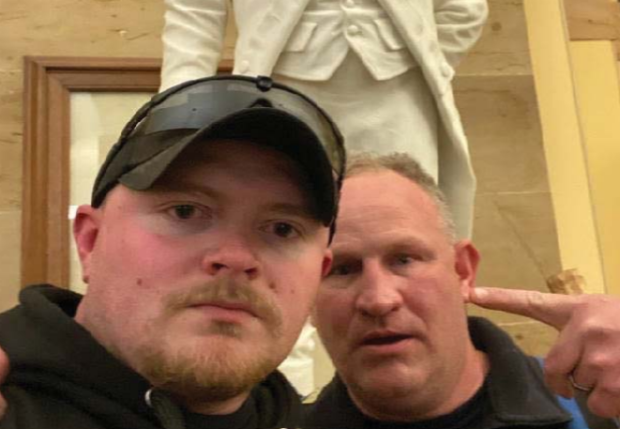Washington – A Washington, D.C., jury on Monday found former Rocky Mount, Virginia, police officer Thomas Robertson guilty on six counts related to his involvement in the January 6, 20201, attack on the Capitol, including impeding law enforcement, disorderly conduct with a dangerous weapon, and obstructing Congress’ certification of the electoral college votes.
After nearly two days of deliberations, Robertson’s conviction offered victory to a Justice Department investigation recently stalled by back-to-back partial or whole acquittals in misdemeanor January 6 bench trials.
Robertson, who now likely faces up to 20 years in prison, was originally freed on pretrial supervision, but was later detained after the government said he allegedly had “a loaded M4 rifle and a partially-assembled pipe bomb at his home, and by purchasing an arsenal of 34 firearms online and transporting them in interstate commerce.”
Robertson was charged in the days following the deadly Capitol breach with his one-time codefendant and fellow officer, Jacob Fracker, who later pleaded guilty to multiple charges and testified against Robertson during his trial. The two men were fired last year from their posts in law enforcement following their alleged presence in the mob.
They were accused of traveling from Virginia to Washington, D.C., ahead of former President Trump’s “Save America” rally where the pair and another man made their way toward the Capitol building donning gas masks.
U.S. Attorney’s Office for D.C.
Prosecutors said the two off-duty officers-turned-rioters split up in the crowd, with Robertson allegedly impeding law enforcement with a stick as he made his way inside the Capitol building. He and Fracker ultimately reunited in the crypt, according to the government.
After the riot, the government told the jury, Robertson allegedly “declared that the next American civil war may have started.”
Prosecutors relied on a playbook of evidence and testimony similar to what was employed during the trial of now-convicted January 6 defendant, Guy Reffitt: show jurors surveillance and body-worn camera video of of the danger and disruption of January 6 and then describe how the defendant allegedly played a role by committing accused crimes.
But unlike Robertson, Reffitt was not accused of actually entering the Capitol building.
Capitol Police and Washington, D.C., police officers described at the trial what happened on January 6. One explained that law enforcement was forced to engage in “hand-to-hand” combat with rioters, although he never specifically named Robertson as one of those. And then Fracker himself testified against his one-time partner.
The defense urged jurors to focus not on Robertson’s words before and after the riot, but his specific actions that day. They argued that the stick with which he was accused of impeding officers was actually meant to help him walk, and they said he entered the Capitol not to obstruct Congress, but to make sure Fracker was safe.
Robertson, “Entered, retrieved, and departed” the Capitol, the defense argued.
But the jurors ultimately ruled the evidence presented at trial proved otherwise, asking for clarity during deliberations about the definition of “deadly or dangerous weapon” and what “obstruction” means.
